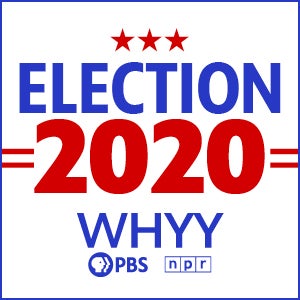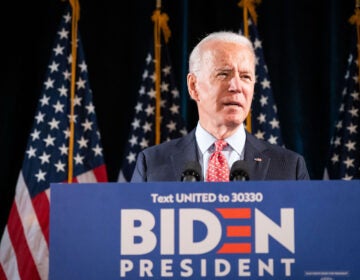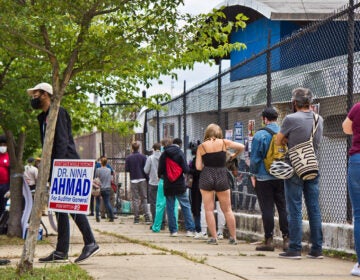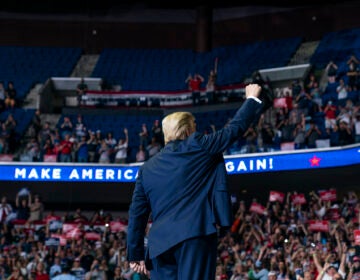The state of local politics on what would have been Pa. and Del.’s primary date
WHYY’s Katie Meyer speaks with Morning Edition host Jennifer Lynn about local elections on what would have been the primary dates for Pa. and Del.
Listen 4:42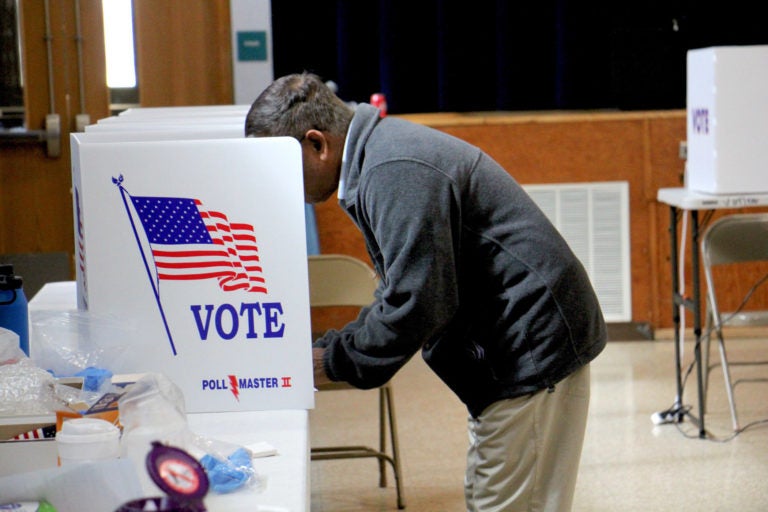
A voter fills out a ballot at Cecelia Snyder Middle School in Bensalem during a special election to choose a new member of the Pennsylvania House of Representatives in March 2020. (Emma Lee/WHYY)
Are you on the front lines of the coronavirus? Help us report on the pandemic.
For those of us who live in Pennsylvania and Delaware, Tuesday, April 28 is the day on which we were supposed to go to the polls to vote in the presidential primary and for down ballot races.
Due to the coronavirus pandemic, the new date for both primaries is June 2 and New Jersey’s primary was also pushed back to July 7.
We turn to WHYY’s political reporter Katie Meyer to talk about this unusual, unprecedented primary election season.
–
Hello, Katie. What were we supposed to be doing today?
Today was going to be the primary for Pennsylvania and also for Delaware. That’s not happening anymore.
And this has led to some very interesting situations, creative ways to run for the offices when you can’t go out and do your handshaking and personal appearances and different ways to get your vote counted.
It’s been very different. And I think one of the big challenges is figuring out how do you still fundraise during this. Fundraising, for people who follow politics closely, often it’s donors, it’s cocktail hours, things like that, where donors can pay the price of admission and go and spend time with prospective candidates. And that’s a huge part of political culture and it’s just not happening right now. What you see candidates doing is trying to figure out ways to connect with voters, to connect with prospective donors. They’re trying to livestream. They’re trying to put together graphics of their campaign promises, things like that. And you really did see this period of like, “Oh, gosh, like, what do we do now?” when people were getting adjusted to this new reality.
Yeah. Have you witnessed anything that just seems off-the-charts different?
Well, all sorts of things. But one story I did, I focused on the First Congressional District of Pennsylvania and the Republican primary where Congressman Brian Fitzpatrick is running against Andy Meehan, who is sort of a dark horse candidate for the GOP nomination. And Meehan, he’s trying to get his name recognition up. He was trying to do remote sign delivery so people could sign up if they wanted a sign on his website and he would send a volunteer out, maybe somebody who is already out doing errands and they would just drop signs off on people’s lawns, contact-free. So things like that you’re starting to see.
What about for voters? Certainly now Pennsylvania and Delaware could go to the polls on June 2. But there are some mail-in options.
Yeah, absolutely. And in Pennsylvania specifically, the state had actually pretty recently adjusted its laws on mail-in ballots. So now you can get one without an excuse. We’re still going to have the polls open in Pennsylvania. The extent to which that’s going to happen is kind of unclear. One of the reasons is a lot of polling places are at nursing homes and long-term care facilities, places that have been really hard hit by coronavirus. And so they’re not going to be open, so there’s going to be fewer polling places and there’s also going to be fewer poll workers because poll workers tend to be older people, retired people who are very vulnerable to coronavirus. And so a lot of them have said, “You know, I can’t do it this year.” People are really being encouraged by the state and by counties to just request a mail-in ballot.
Katie, let’s talk about the pandemic as partisan, as political. I think, for example, of U.S. Senator Pat Toomey going against Gov. Tom Wolf in Pennsylvania on when we should be back toward normal.
Yeah, I mean, right away there was this show of unity that you don’t see too often, both on the federal level and in Harrisburg. People, they came together. They passed these relief packages. And now as we try to figure out and navigate the next several steps of dealing with this pandemic, you’ve started to see a partisan branching off. So Republicans like Pat Toomey largely want to open up sooner, want to let businesses continue operating.
Democrats, by and large, I’m not trying to paint with too broad of a brush, but by and large have been a little more cautious, have wanted to keep closures in order more broadly and for a longer period of time. And so that conflict that you saw between Toomey and Wolf, Wolf has also gotten into conflicts with a lot of the Republicans who controlled the state House and Senate. And I’ve been following that. And so that’s made it tough to figure out exactly how to respond to this. What kind of aid is going to be available to businesses? We just don’t know yet. How long are they going to ultimately be not working? We kind of don’t know that.
Gov. Wolf has started rolling out plans for counties to start going back to work. Some Republicans have been pretty happy about that. There is a lot of partisan tension over this and a lot of fundamental disagreements about the best way to keep people safe and also keep businesses from going out of business.
Nice speaking with you. WHYY political reporter Katie Meyer, thanks for your time today.
Thank you.
WHYY is your source for fact-based, in-depth journalism and information. As a nonprofit organization, we rely on financial support from readers like you. Please give today.



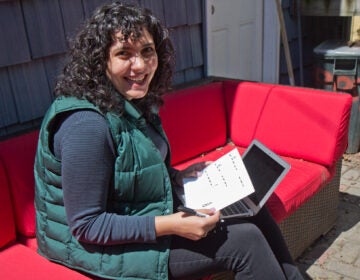
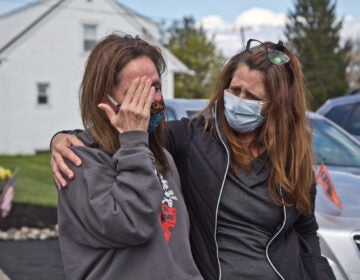
![CoronavirusPandemic_1024x512[1]](https://whyy.org/wp-content/uploads/2020/03/CoronavirusPandemic_1024x5121-300x150.jpg)
